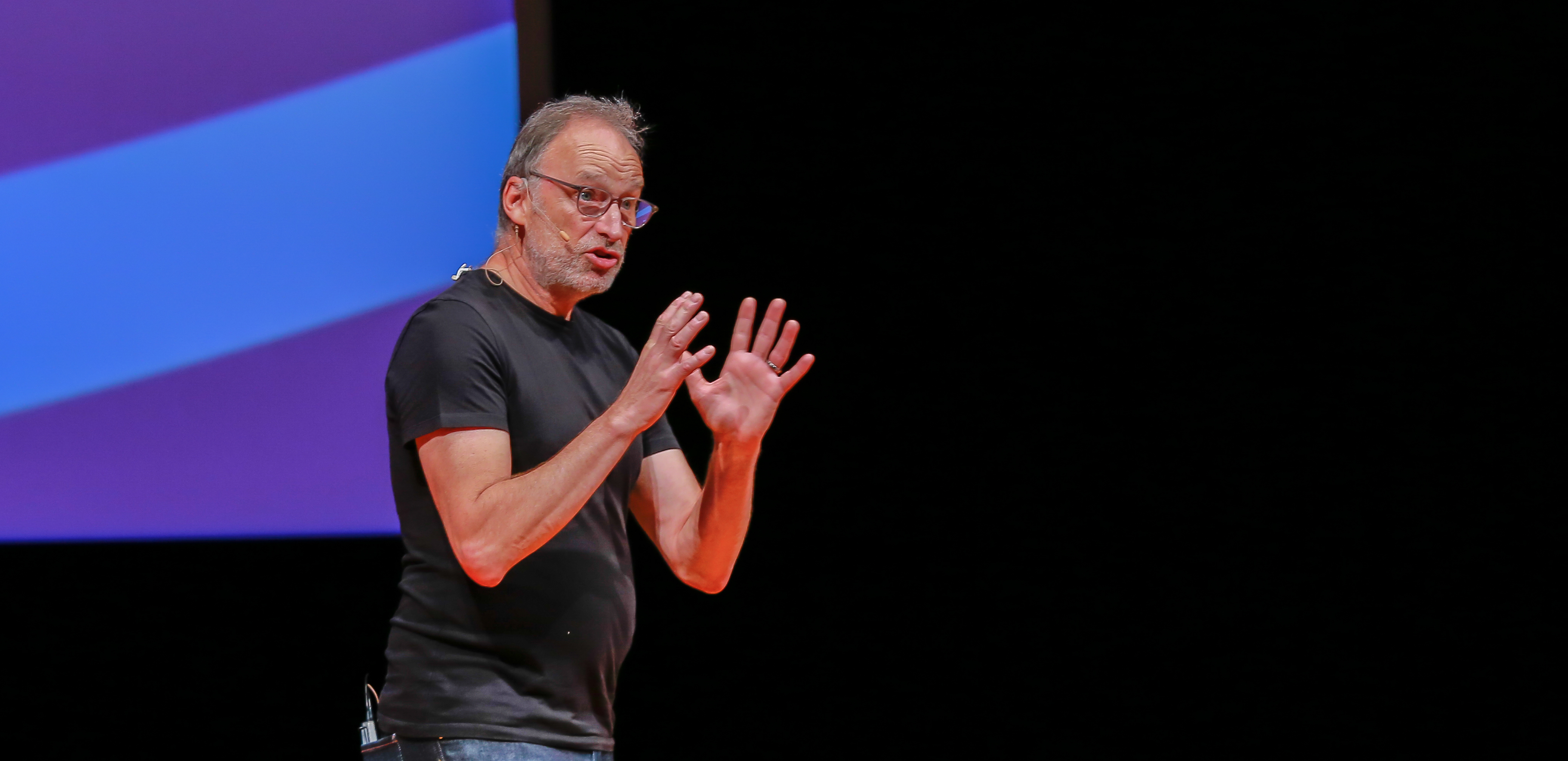From Descartes to Morin

The old world vs. the new
Sciamma believes the world is at risk without design. However, the world is changing.
The old world was based on the Cartesian way of thinking—breaking up big problems into smaller pieces. This material world worked in linear, closed, regulated, highly local, pyramidal environments led by the state. The typical assembly line factories, made popular during the industrial revolution, are an embodiment of that old world.
The new world, however, is digital, deregulated, open, glocal (global and local) and led by networks of people thinking critically about big, complex problems. Sciamma urged the audience to part with Descartes and open their minds to a new way of thinking conceptualized by French philosopher and sociologist Edgar Morin.
Morin's philosophy urges us to look at the world in all its complexity, similar to a Romanesco broccoli. Romanesco broccoli are fractal vegetables revealing the same level of complexity no matter how magnified your point of view. In an assembly line, workers focused on repeating one task over and over again without much consideration for the end product. In the new world, complex problems make it necessary to collaborate and take ownership of the system, project or problem as a whole. Designers help facilitate this collaboration by creating a common language through an inherently multidisciplinary approach.

According to Sciamma, " Design is not about chairs, cars, packaging or shops. We don't teach people to do this in my school. We care about people. Design is about life. Designers are humanists making the world simple, fair and beautiful. This is the punchline of design." Designers don't just answer questions or briefs, they "Destroy the question, reformulate it and then answer because the question may not be a good one. You have to challenge the question," says Sciamma.
Sciamma emphasizes that the meaning of the word design explains how it is more than just adding beauty to the end of a process—it is "thinking or producing in order to move in a given direction." In order to be a designer, you have to question, represent, make, and solve employing a creative, cross-disciplinary approach throughout.
"It's about human experience," Sciamma remarked.
Companies have capitalized on the power of design by creating relationships with their customers through design and embedding it into the structure and process of the organization. Employing a humanist design approach to commerce means that customers are treated as decision makers persuaded to be loyal to the brand through trust and relationship building.
Apple is a well-known example of a design-first strategy successfully threaded through every element of the brand. Sciamma believes that companies must be investing in design. Citing Phillip Picaud, design director at Carrefour, in a product development cycle, design makes up 1% of the investment, but delivers 40% of the value.
Ideally, companies would put design at the heart of what they do, including a designer as a member of the board. Working with designers creates a "force field of design" that works "like a magnet to bring out the design thinking in everyone," explained Sciamma.
Working in project mode, designers act as the glue to help everyone involved "talk to each other through the natural language of design," he added. Examples of other brands and initiatives that have done this well are Nespresso, Airbnb and the city of Singapore, according to Sciamma.
He concluded his lecture with his design manifesto, "Design is more than a profession, more than a discipline. Design is a transformative force field, embodied by demanding professionals, readers and thinking of complexity producing experiences that provide beauty in human lives."
When talking about the future, Sciamma believes that "one day there will be no design schools because design will invade everything. We will all be designers."
Morin's philosophy urges us to look at the world in all its complexity, similar to a Romanesco broccoli. Romanesco broccoli are fractal vegetables revealing the same level of complexity no matter how magnified your point of view. In an assembly line, workers focused on repeating one task over and over again without much consideration for the end product. In the new world, complex problems make it necessary to collaborate and take ownership of the system, project or problem as a whole. Designers help facilitate this collaboration by creating a common language through an inherently multidisciplinary approach.

Dominique Sciamma, Managing Director at Strate School of Design in France, presents on stage during Enrichment in the Fall 2017
According to Sciamma, " Design is not about chairs, cars, packaging or shops. We don't teach people to do this in my school. We care about people. Design is about life. Designers are humanists making the world simple, fair and beautiful. This is the punchline of design." Designers don't just answer questions or briefs, they "Destroy the question, reformulate it and then answer because the question may not be a good one. You have to challenge the question," says Sciamma.
Sciamma emphasizes that the meaning of the word design explains how it is more than just adding beauty to the end of a process—it is "thinking or producing in order to move in a given direction." In order to be a designer, you have to question, represent, make, and solve employing a creative, cross-disciplinary approach throughout.
"It's about human experience," Sciamma remarked.
Companies have capitalized on the power of design by creating relationships with their customers through design and embedding it into the structure and process of the organization. Employing a humanist design approach to commerce means that customers are treated as decision makers persuaded to be loyal to the brand through trust and relationship building.
Apple is a well-known example of a design-first strategy successfully threaded through every element of the brand. Sciamma believes that companies must be investing in design. Citing Phillip Picaud, design director at Carrefour, in a product development cycle, design makes up 1% of the investment, but delivers 40% of the value.
Ideally, companies would put design at the heart of what they do, including a designer as a member of the board. Working with designers creates a "force field of design" that works "like a magnet to bring out the design thinking in everyone," explained Sciamma.
Working in project mode, designers act as the glue to help everyone involved "talk to each other through the natural language of design," he added. Examples of other brands and initiatives that have done this well are Nespresso, Airbnb and the city of Singapore, according to Sciamma.
He concluded his lecture with his design manifesto, "Design is more than a profession, more than a discipline. Design is a transformative force field, embodied by demanding professionals, readers and thinking of complexity producing experiences that provide beauty in human lives."
When talking about the future, Sciamma believes that "one day there will be no design schools because design will invade everything. We will all be designers."

